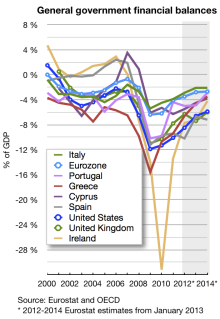
Back الانحدار الاقتصادي الأيرلندي ما بعد 2008 Arabic Crisi financera irlandesa Catalan Crisis financiera en Irlanda de 2008-2013 Spanish Crise financière irlandaise French Финансово-экономический кризис в Ирландии (2008—2013) Russian


The post-2008 Irish economic downturn in the Republic of Ireland,[2][3][4][5][6] coincided with a series of banking scandals, followed the 1990s and 2000s Celtic Tiger period of rapid real economic growth fuelled by foreign direct investment, a subsequent property bubble which rendered the real economy uncompetitive, and an expansion in bank lending in the early 2000s. An initial slowdown in economic growth amid the international financial crisis of 2007–2008 greatly intensified in late 2008 and the country fell into recession for the first time since the 1980s. Emigration, as well as unemployment (particularly in the construction sector), escalated to levels not seen since that decade.
The Irish Stock Exchange (ISEQ) general index, which reached a peak of 10,000 points briefly in April 2007, fell to 1,987 points—a 14-year low—on 24 February 2009 (the last time it was under 2,000 being mid-1995).[7] In September 2008, the Irish government—a Fianna Fáil–Green coalition—officially acknowledged the country's descent into recession; a massive jump in unemployment occurred in the following months. Ireland was the first state in the eurozone to enter recession, as declared by the Central Statistics Office (CSO).[8] By January 2009, the number of people living on unemployment benefits had risen to 326,000—the highest monthly level since records began in 1967—and the unemployment rate rose from 6.5% in July 2008 to 14.8% in July 2012.[9] The slumping economy drew 100,000 demonstrators onto the streets of Dublin on 21 February 2009, amid further talk of protests and industrial action.[10]
With the banks "guaranteed",[11] and the National Asset Management Agency (NAMA) established[12] on the evening of 21 November 2010, then Taoiseach Brian Cowen confirmed on live television that the EU/ECB/IMF troika would be involving itself in Ireland's financial affairs. Support for the Fianna Fáil party, dominant for much of the previous century, then crumbled; in an unprecedented event in the nation's history, it fell to third place in an opinion poll conducted by The Irish Times—placing behind Fine Gael and the Labour Party, the latter rising above Fianna Fáil for the first time. On 22 November, the Greens called for an election the following year.[13] The 2011 general election replaced the ruling coalition with another between Fine Gael and Labour. This coalition continued with the same austerity policies of the previous coalition, as the country's larger parties all favour a similar agenda, but subsequently lost power in the 2016 General Election.
Official statistics showed a drop in most crimes coinciding with the economic downturn. Burglaries, however, rose by approximately 10%[14] and recorded prostitution offences more than doubled from 2009 to 2010.[15][16] In late 2014 the unemployment rate was 11.0% on the seasonally adjusted measure, still over double the lows of the mid-2000s but down from a peak of 15.1% in early 2012. By May 2016, this figure had fallen to 7.8%,[17] and had returned to a pre-downturn level of 4.5% by June 2019[18]
- ^ "General government surplus/deficit as percentage of GDP". Google/Eurostat. 27 October 2012. Archived from the original on 23 April 2014. Retrieved 10 November 2012.
- ^ "Trends in Economic Stress and the Great Recession in Ireland". Department of Social Protection. 12 May 2014. Archived from the original on 20 October 2019. Retrieved 12 May 2014.
- ^ "Wage Flexibility and the Great Recession: The Response of the Irish Labour Market" (PDF). Trinity College Dublin. 9 September 2014. Retrieved 9 September 2014.
- ^ "The Great Recession had a HUGE impact on Ireland's young people". TheJournal.ie. 5 February 2015. Archived from the original on 7 May 2020. Retrieved 5 February 2015.
- ^ "Economic stress and the great recession in Ireland: polarization, individualization or 'middle class squeeze'" (PDF). University College Dublin. Archived (PDF) from the original on 4 March 2016. Retrieved 16 February 2015.
- ^ "Winners And Losers? The Equality Impact of the Great Recession in Ireland". The Equality Authority. 2014. Archived from the original on 20 April 2015.
- ^ "ISEQ falls to 14-year low". RTÉ News. Raidió Teilifís Éireann. 24 February 2009. Archived from the original on 25 February 2009. Retrieved 24 February 2009.
- ^ "Central Statistics Office Ireland Key short-term economic indicators:Gross Domestic Product (GDP)". Archived from the original on 17 December 2018. Retrieved 13 March 2013.
- ^ "Seasonally Adjusted Standardised Unemployment Rates". Archived from the original on 19 October 2019. Retrieved 13 March 2013.
- ^ Cite error: The named reference
Huge protest over Irish economywas invoked but never defined (see the help page). - ^ "Credit Institutions (Financial Support) Act 2008". Iris Oifigiúil. 2 October 2008. Archived from the original on 15 February 2015. Retrieved 2 October 2008.
- ^ Lenihan, Brian (16 September 2009). "National Asset Management Agency Bill 2009, Second Stage Speech" (PDF). Archived from the original (PDF) on 21 July 2011. Retrieved 7 October 2009.
- ^ "Green Party calls for election date to be set". RTÉ News. 22 November 2010. Archived from the original on 20 October 2012. Retrieved 22 November 2010.
- ^ "Burglary and related offences". Central Statistics Office. 20 December 2012. Archived from the original on 19 January 2013. Retrieved 13 March 2013.
- ^ "Public order and other social code offences". Central Statistics Office. 20 December 2012. Archived from the original on 19 January 2013. Retrieved 13 March 2013.
- ^ McDonald, Henry (26 January 2013). "Irish police launch hunt for gang after detective shot dead". The Guardian. London. Archived from the original on 13 December 2017. Retrieved 26 January 2013.
- ^ "Unemployment falls to post-crash low of 7.8%". The Irish Times. 31 May 2016. Archived from the original on 3 November 2016. Retrieved 1 June 2016.
- ^ "Monthly Unemployment - June 2019". CSO. 2 July 2019. Archived from the original on 14 November 2019. Retrieved 30 May 2021.
© MMXXIII Rich X Search. We shall prevail. All rights reserved. Rich X Search